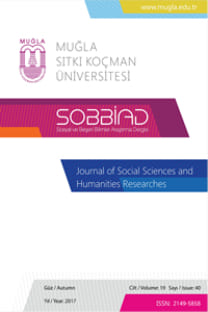Türkiye Ekonomisi Açısından Endüstri 4.0 ve Rekabet Gücü İlişkisi
Endüstri 4.0; modern teknolojilerle, modern değer zincirlerini bir araya getiren üretimde ortaya çıkan dijital dönüşümün yarattığı son sanayi devrimidir. Bu dönüşüm, gerçek ve dijital sistemleri, bilişimi, Nesnelerin İnterneti ile çeşitlilik kazanan İnternet servislerini içinde barındırır. Endüstri 4.0; internet, bilişim, sensor, otomasyon, yapay zekâ – makine öğrenmesi ve robotik teknolojilerin sanayiyi önemli düzeyde etkilemesi ve değiştirmesi ile meydana gelen bir süreçtir. Günümüzde sanayi üretiminde yaşanan büyük değişimler ve sanayi devrimleri, ülkeleri rekabet gücü elde edebilmek için söz konusu değişim hareketine uyum sağlamak zorunda bırakmıştır, elde etmek istedikleri bu rekabet gücü için bazı stratejiler geliştirmişlerdir. Bu süreç 2011 yılında başlamış ve Endüstri 4.0 olarak adlandırılmıştır. Bu süreçten en önemli iki beklenti, yüksek verimlilik ve yüksek katma değer elde etme beklentisidir. Gelişmiş ve gelişmekte olan ekonomilerin süreci yakalayıp sürdürebilmeleri, gelecekte uluslararası konjonktürün neresinde olacaklarının belirlenmesi açısından oldukça önemlidir.
Anahtar Kelimeler:
Endüstri 4.0, Rekabet gücü, Dijital dönüşüm
___
- Adamik, A., & Nowicki, M. (2018). Co-creating value in the era of Industry 4.0. Przedsiebiorczosc i Zarzadzanie. Entrepreneurship and Management. Volume XIX, part 1. 23-39.
- Advantisconseils (2020). Cabinet Advantis Expert Accompagnement Strategie Turquie. [online] Erişim adresi https://www.advantisconseils.com/tr/index
- Alicke, K., Rexhausen, D., & Seyfert, A. (2019, January 14). Supply Chain 4.0 in consumer goods. Erişim adresi https://www.mckinsey.com/industries/consumer-packaged-goods/our-insights/supply-chain-4-0-in-consumer-good
- Bal, H., & Erkan, Ç. (2019). Industry 4.0 and Competitiveness. Procedia Computer Science. 158. 625-631. 10.1016/j.procs.2019.09.096.
- Baldassarre, F., Ricciardi, F., & Campo, R. (2017). The Advent of Industry 4.0 In Manufacturing Industry: Literature Review And Growth Opportunities Danish Institute of Industry 4.0. (2017). Global Industry 4.0 Readiness Report 2016: Industry 4.0 Readiness Index.
- Dünya Bankası, Dünya Kalkınma Göstergeleri. Erişim adresi https://data.worldbank.org/
- Erkurt, H., Vayvay, Ö., & Okan, E. Y. (2020). Industry 4.0: Opportunities and Challenges for Turkey. D. Z. Kaushik Kumar içinde, Digital Manufacturing and Assembly Systems in Industry 4.0 (s. 31). Newyork: CRC Press.
- Gabriel, M., & Pessl, E. (2016). Industry 4.0 and sustainability impacts: Critical discussion of sustainability aspects with a special focus on future of work and ecological consequences. Annals of the Faculty of Engineering Hunedoara, 14(2), 131.
- Geissbauer, R., Vedso, J. ve Schrauf, S. (2016). Industry 4.0: Building the digital enterprise. 2016 Global Industry 4.0 Survey. Erişim adresi https://www.pwc.com/gx/en/industries/industries- 4.0/landing-page/industry- 4.0-building-your-digital-enterprise-april-2016.pdf. 07.09.2018.
- Global Innovation Index, 2018 Erişim adresi https://www.globalinnovationindex.org/userfiles/file/reportpdf/GII-2018/Front-and-back-covers.pdf
- Global Manufacturing Competitiveness Index. 2016 Erişim adresi https://www2.deloitte.com/global/en/pages/manufacturing/articles/global-manufacturing-competitiveness-index.html
- Global Media Report (Rep.). (2015). McKinsey&Company. Erişim adresi https://www.mckinsey.com/~/media/McKinsey/Industries/Technology%20Media%20and%20Telecommunications/Media%20and%20Entertainment/Our%20Insights/Global%20Media%20Report%202015%20-%20Old/Copy%20of%20McKinsey%20Global%20Media%20Report%202015.pdf
- Graney, G. (2017). “No Matter What You Call It: Industry 4.0 Means Manufacturing in Transition”, A QAD White Paper for Global Manufacturers. IFR International Federation of Robotics. World Robotics 2019 Edition. Erişim adresi https://ifr.org/free-downloads/
- Kuzmišin,P. (2016), “Industry 4.0 In the Context of Competitiveness”, Journal of Economic Issues, 1(2016), pp. 13-27.
- Li, G., Hou, Y. & Wu, A. (2017). Fourth Industrial Revolution: technological drivers, impacts and coping methods. Chin. Geogr. Sci. 27, 626–637. https://doi.org/10.1007/s11769-017-0890-x
- Nusca, A. (2018). U.S. Returns to No. 1 in Global Competitiveness, Report Says. http://fortune.com/2018/10/16/global-competitiveness-report-usa/. 13.11.2018. OECD, “Transformative Technologies and jobs of the future”, Background report for the Canadian G7 Innovation Ministers’ Meeting, 2018.
- Öztürk, D. (2017). ‘Technological transformation of manufacturing by smart factory vision: industry 4.0. IJDR (International Journal of Development Research), 17371-17382.
- Romanova, O. G. A., Berg, D. B., & Matveeva, Y. A. (2017). Creating Competitive Strategies of Industrial Enterprises from the Standpoint of Corporate Social Responsibility. Economic and Social Changes: Facts, Trends, Forecast. Volume 10, Issue 6, 138- 152.
- Saatçioğlu, Ö. Y., Özispa, N., & Kök, G. T. (2019). Scrutinizing the Barriers That Impede Industry 4.0 Projects: A Country-Wide Analysis for Turkey. In Agile Approaches for Successfully Managing and Executing Projects in the Fourth Industrial Revolution (pp. 294-314). IGI Global.
- Schwab, K. (2015). The Fourth Industrial Revolution: What It Means and How to Respond. Erişim adresi https://www.foreignaffairs.com/articles/2015-12-12/fourth- industrial-revolution.) (01.07.2018).
- Schwab, K. (2018). The Global Competitiveness Report 2017-2018. World Economic
- Topleva, S. (2018). INDUSTRY 4.0: TRANSFORMING ECONOMY THROUGH VALUE ADDED. Asian Journal of Economic Modelling. 2018, 6(1): 37-46.
- TIBCO; (2017), “Industry 4.0: The Next Industrial Revolution: Drivers, Methods, Technologies, Capabilities”, White Paper, Erişim adresi https://www.kennisportal.com/kp/tibco/TIBCO-Industry-4.0-The-Next-Industrial-Revolution.pdf, 14.08.2018.
- Tuncel, C. O., & Polat, A. (2016). Sectoral System of Innovation and Sources of Technological Change in Machinery Industry: An Investigation on Turkish Machinery Industry1. Procedia - Social and Behavioral Sciences, 229, 214-225. doi:10.1016/j.sbspro.2016.07.131
- Tutar H., Terzi D., Tınmaz G. (2018). Türkiye'nin "Vizyon 2023" Stratejisi İle Almayanın "2025" Stratejik Hedeflerinin Endüstri 4.0 Göstergeleri İtibariyle Karşılaştırılması . International Journal Entrepreneurship and Management Inquiries (Journal EMI) , Cilt 2 , Sayı 3, Sayfalar 195 – 212
- Türkiye’de İsviçre Ticaret Odası Derneği. 1984. Erişim adresi https://www.tr-ch.org/tr/
- TÜSİAD. (2017). Türkiye’nin Küresel Rekabetçiliği İçin Bir Gereklilik Olarak Sanayi 4.0: Gelişmekte Olan Ekonomi Perspektifi. Erişim adresi.http://www.tusiad.org/indir/2016/sanayi-40.pdf.
- Yüksel, A., N., & Şener, E. (2017). The reflections of digitalization at organizational level: industry 4.0 in Turkey. Pressacademia. 6. 291-300. 10.17261/Pressacademia.2017.688.
- Word Economic Forum. (2018). The Global Risks Report 2018 13th Edition.
- Wyatt, S., Bieller, S., Müller, C., Qu, D., & Song, X. ( 2019). World Robotics 2019 Industrial Robots. Shanghai: International Federation of Robotics.
- ISSN: 2149-5858
- Yayın Aralığı: Yılda 2 Sayı
- Başlangıç: 2000
- Yayıncı: Mugla Sitki Kocman University
Sayıdaki Diğer Makaleler
Türkiye Ekonomisi Açısından Endüstri 4.0 ve Rekabet Gücü İlişkisi
Girişimcilik Niyetine Sosyal Medyanın Etkisinin Sosyo-Demografik Değişkenler Bağlamında İncelenmesi
Ali YILDIZ, Fatih Mehmet DEMİR, Aytekin FIRAT
Erken Cumhuriyet Döneminde Ernst Arnold Egli’nin Köy İlkmektep Planları ve Eğitimin Önemi
Kıbrıs Muhassılı Silahdar Osman Ağa’nın Muhallefatı (1764)
Mikail KAZAN, Halil Erdem AKOĞLU, Ercan POLAT
Türkiye’de Kırsal Değişme Süreçleri
